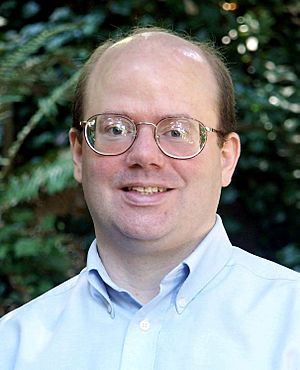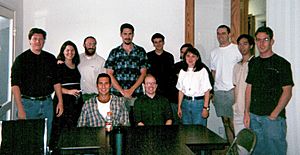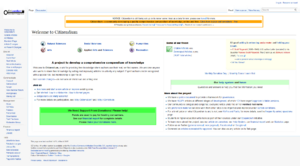Larry Sanger facts for kids
Quick facts for kids
Larry Sanger
|
|
|---|---|

Sanger in 2006
|
|
| Born |
Lawrence Mark Sanger
July 16, 1968 Bellevue, Washington, U.S.
|
| Education | |
| Occupation | Internet project developer Philosopher |
| Known for |
|
| Children | 2 |
| Signature | |
 |
|
Lawrence Mark Sanger (![]() i/ˈsæŋər/; born July 16, 1968) is an American Internet project developer and philosopher who co-founded Wikipedia along with Jimmy Wales. Sanger coined Wikipedia's name, and provided initial drafts for many of its early guidelines, including the "Neutral point of view" and "Ignore all rules" policies. Prior to Wikipedia, he was the editor-in-chief of Nupedia, another online encyclopedia and the predecessor of Wikipedia. He later worked on other encyclopedic projects, including Encyclopedia of Earth, Citizendium, and Everipedia, and advised the nonprofit American political encyclopedia Ballotpedia.
i/ˈsæŋər/; born July 16, 1968) is an American Internet project developer and philosopher who co-founded Wikipedia along with Jimmy Wales. Sanger coined Wikipedia's name, and provided initial drafts for many of its early guidelines, including the "Neutral point of view" and "Ignore all rules" policies. Prior to Wikipedia, he was the editor-in-chief of Nupedia, another online encyclopedia and the predecessor of Wikipedia. He later worked on other encyclopedic projects, including Encyclopedia of Earth, Citizendium, and Everipedia, and advised the nonprofit American political encyclopedia Ballotpedia.
While in college, Sanger began using the Internet for educational purposes and joined the online encyclopedia Nupedia as editor-in-chief in 2000. Disappointed with the slow progress of Nupedia, Sanger proposed using a wiki to solicit and receive articles to put through Nupedia's peer-review process; this change led to the development and launch of Wikipedia in 2001. Sanger continued to serve as Nupedia's editor-in-chief and as an active contributor to Wikipedia in its first year, but he was laid off and left the projects in March 2002. Sanger's status as a co-founder of Wikipedia has been questioned by Wales but is generally accepted.
Since Sanger's departure from Wikipedia, he has been critical of the project, describing it in 2007 as being "broken beyond repair". He has argued that, despite its merits, Wikipedia lacks credibility and accuracy due to a lack of respect for expertise and authority. Since 2020, he has criticized Wikipedia for what he perceives as a left-wing and liberal ideological bias in its articles.
In 2006, he founded Citizendium to compete with Wikipedia. In 2010, he stepped down as editor-in-chief. In 2020, he left Citizendium entirely. In 2017, he joined Everipedia as chief information officer (CIO). He resigned in 2019, to establish a Knowledge Standards Foundation and the "encyclosphere". As of 2023[update], Sanger was serving as the executive director of the Knowledge Standards Foundation. Sanger's other interests include a focus on philosophy–in particular epistemology, early modern philosophy, and ethics. He taught philosophy at his alma mater, Ohio State University.
Contents
Early life and education
Lawrence Mark Sanger was born in Bellevue, Washington, on July 16, 1968. His father Gerry was a marine biologist who studied seabirds and his mother raised the children. When he was seven years old, his family moved to Anchorage, Alaska, where he grew up. He was interested in philosophical topics at an early age and decided "to study philosophy and make it my life's work" at the age of 16.
In high school, he participated in debate, which Sanger says influenced his views on neutrality due to these debates exposing him to different issues and arguments from both sides:
And so I'd look up articles about those things, and I was always furious when I came across an article that failed to present one side fairly or at all. The worst instances were when [the author] would just come out and say what their position is. It just struck me as being really unfair.
Sanger graduated from high school in 1986 and attended Reed College, majoring in philosophy. In college he became interested in the Internet and its potential as a publishing outlet. Sanger set up a listserver as a medium for students and tutors to meet for tutoring and "to act as a forum for discussion of tutorials, tutorial methods, and the possibility and merits of a voluntary, free network of individual tutors and students finding each other via the Internet for education outside the traditional university setting". He started and moderated a libertarian philosophy discussion list, the Association for Systematic Philosophy. In 1994, Sanger wrote a manifesto for the discussion group:
The history of philosophy is full of disagreement and confusion. One reaction by philosophers to this state of things is to doubt whether the truth about philosophy can ever be known, or whether there is any such thing as the truth about philosophy. But there is another reaction: one may set out to think more carefully and methodically than one's intellectual forebears.
Around 1994, Sanger met Jimmy Wales after subscribing to Wales' mailing list titled Moderated Discussion of Objectivist Philosophy (MDOP). Sanger received a Bachelor of Arts degree in philosophy from Reed in 1991, a Master of Arts from Ohio State University in 1995, and a Doctor of Philosophy from Ohio State University in 2000. Beginning in 1998, he and a friend ran a website called "Sanger and Shannon's Review of Y2K News Reports", a resource for people such as managers of computer systems who were concerned about the year 2000 problem.
Nupedia and Wikipedia
Nupedia was a web-based encyclopedia whose articles were written by volunteer contributors possessing relevant subject matter expertise and reviewed by editors prior to publication, and were licensed as free content. It was conceived by Jimmy Wales and underwritten by his company Bomis. Wales had interacted with Sanger on mailing lists. In January 2000, Sanger had e-mailed Wales and others about a potential "cultural news blog" project that would cover social and political issues that he had in mind after January 1, 2000, had passed and rendered his Y2K site obsolete. Wales replied with "Instead of doing that, why don't you come and work on this idea that I've had?", presented the idea of Nupedia to Sanger, and invited him to join the project. Sanger was hired as Nupedia's editor-in-chief. He began to oversee Nupedia in February 2000, developing a review process for articles and recruiting editors. Through working on Nupedia, Sanger "found that it was a fascinating problem to organize people online to create encyclopedias". Articles were reviewed through Nupedia's email system before being posted on the site.
Nupedia made very slow progress and was at a standstill at the end of 2000, causing consternation to Sanger and Wales, with Sanger saying that "by the summer of 2000, it had become clear that the process we tested out [for making articles on Nupedia] was very slow." In January 2001, Sanger proposed the creation of a wiki to speed article development, which resulted in the launch of Wikipedia on January 15, 2001. Wikipedia was initially intended as a collaborative wiki for which the public would write entries that would then be fed into Nupedia's review process. However, the majority of Nupedia's experts and the Nupedia advisory board wanted little to do with the project, with members of the Nupedia advisory board mailing list dismissing the idea of Wikipedia as being ridiculous.
The idea of using a wiki came when Sanger met up with his friend Ben Kovitz for dinner on January 2, 2001, when Sanger was first introduced to wiki software. Kovitz, whom Sanger had known from philosophy mailing lists, was a computer programmer who had come across Ward Cunningham's Wiki. Sanger was impressed with the possibilities offered by wikis and called Wales, who agreed to try it. Sanger originated the name "Wikipedia", chosen from "a long list of names", which he later said was "a silly name for what was at first a very silly project".
Sanger created Wikipedia's first introductory pages and home pages, and invited the first few people to make contributions to the website, which was then called the Nupedia Wiki. Within a few days of its launch, Wikipedia had outgrown Nupedia and a small community of editors had gathered. Sanger served as Wikipedia's "chief organizer", inviting new contributors and drafting early policy, including "Ignore all rules", "Neutral point of view", "No original research", and "Verifiability". He embraced Wikipedia's encouragement of boldness among its editors, telling users to "not worry about messing up". Sanger created the concept of "Brilliant prose", which evolved into featured articles as a way to showcase Wikipedia's highest-quality articles.
Sanger soon grew disillusioned with Wikipedia, saying by mid-2001 its community was being "overrun" by "trolls" and "anarchist-types", who were "opposed to the idea that anyone should have any kind of authority that others do not". While such issues were not important to Sanger when Wikipedia was a source of articles for Nupedia, as it grew into an independent project he started to become more concerned about the community. Sanger came into conflict with Wikipedia editors who did not appreciate his modes of organization and exercising authority, including The Cunctator, another active early editor. Sanger responded to these conflicts by proposing a stronger emphasis on expert editors and giving certain contributors the authority to resolve disputes and enforce rules. He also asked to be given more respect and deference by Wikipedians, which backfired and led to an increase in friction between him and the community.
Sanger was the only editorial employee of Wikipedia. In early 2002, Bomis announced the possibility of placing advertisements on Wikipedia, in part to pay for Sanger's employment, but the project was opposed to any commercialization and the market for Internet advertising was small. Sanger was laid off in February 2002 after Bomis lost a grant in the Dot-com crash, and he resigned as editor-in-chief of Nupedia and chief organizer of Wikipedia on March 1. Sanger said he ended his participation in Wikipedia and Nupedia as a volunteer because he could not do justice to the tasks as a part-timer, he was frustrated by sustained arguments, and while he cared about the project, it was "not something [he] would have chosen as a hobby" and he would rather spend time with family, "reading and writing philosophy, and playing fiddle." In a post to the Wikipedia community, Sanger said that his departure from Nupedia might not be permanent if funds were found for it again in the future.
Sanger attempted to revive Nupedia throughout 2002 as its activity petered out. He tried to find an organization that would take control of it because it appeared Bomis and Wales seemed uninterested in managing it. Sanger also inquired about purchasing the domain and other proprietary materials from Bomis. He said Nupedia's demise was not entirely due to the inherent inefficiencies in its review process. The Nupedia server crashed in September 2003 and the site was never relaunched.
Status as Wikipedia co-founder
Sanger's role in co-founding or organizing Wikipedia was periodically the subject of discussions within the community. It was also the subject of edits by Wales to Wikipedia articles in 2005, after which Sanger accused Wales of "rewriting history" by disregarding his involvement; Wales told Wired he only clarified details about Sanger's contribution to the project and removed factual errors, adding that he should not have done so. Wales later stated he had initially heard of the wiki concept from Bomis employee Jeremy Rosenfeld rather than Sanger.
On his personal website, Sanger posted several links that appear to support his role as a co-founder. As early as January 17, 2001, Sanger was cited as "Instigator of Nupedia's wiki" by active volunteer and chief copyeditor Ruth Ifcher, and he was identified as a co-founder of Wikipedia in September 2001. Sanger has said he organized Wikipedia while Wales was mostly focused on Bomis.com.
Later activities
Citizendium
At the Wizards of OS conference in September 2006, Sanger announced the launch of a new wiki-based encyclopedia called Citizendium—short for "citizens' compendium"—as a fork of Wikipedia. The objective of the fork was to address perceived flaws in the way Wikipedia functions; anonymous editing was disallowed, all users were required to use their real names, and there was a layer of experts who had extra authority. It was an attempt by Sanger to establish a credible online encyclopedia based on scholarship, aiming to bring more accountability and academic rigor to articles. The site attempted to implement an expert review process and experts tried to reach a decision in disputes that could not be resolved by consensus.
Sanger predicted a rapid increase in Citizendium's traffic at its first anniversary in 2007. After a burst of initial work, however, the site went into decline and most of the experts were not retained. In 2011, Ars Technica reporter Timothy B. Lee said Citizendium was "dead in the water". Lee noted that Citizendium's late start was a disadvantage and that its growth was hindered by an "unwieldy editing model". In 2014, the number of Citizendium contributors was under 100 and the number of edits per day was about "a dozen or so" according to Winthrop University's Dean of Library Services. By August 2016, Citizendium had about 17,000 articles, 160 of which had undergone expert review.
Sanger, who in early 2007 announced he did not intend to head Citizendium indefinitely, effectively ceased to edit it in early 2009, although an announcement confirming this was not made until July 30, 2009, on the Citizendium-l mailing list. He stepped down as editor-in-chief of Citizendium on September 22, 2010, but said he would continue to support the project. On July 2, 2020, Sanger wrote that he had transferred legal ownership of the Citizendium domain name to Pat Palmer, saying that Citizendium had "stopped being 'my' project a long time ago. But until this morning, I still owned the domain name." Sanger refused to recognize women's studies as a top-level category on Citizendium, calling it too "politically correct". Sanger later said that "it wasn't about women's studies in particular", but about "too much overlap with existing groups".
Other projects
Larry Sanger has been involved with several other online encyclopedia projects. In 2005, he joined the Digital Universe Foundation as Director of Distributed Content Programs. He was a key organizer of the Digital Universe Encyclopedia web project that was launched in early 2006. The Digital Universe encyclopedia recruited recognized experts to write articles and to check user-submitted articles for accuracy. The first part of the project was the expert-written and -edited Encyclopedia of Earth. Sanger later felt the pace of content production at the Foundation was too slow for him; he proposed open content to help speed development but the proposal was rejected.
Sanger has worked at the WatchKnowLearn project, a non-profit organization that focuses on educating young children using videos and other media on the web. It is funded by grants, philanthropists, and the Community Foundation of Northwest Mississippi. Sanger headed the development of WatchKnowLearn from 2008 to 2010. It consists of a repository of educational videos for kindergarten to the 12th grade. In February 2013, it ranked as the top search result among educational videos on Google's search engine and attracted over six million page views each month. In 2010 and 2011, he continued developing a web-based reading-tutorial application for beginning readers, which was launched as Reading Bear in 2012. It uses the principles of phonics and multimedia presentations such as videos, PowerPoint presentations, and ebooks to teach pronunciation to children. It also aims to teach the meaning and context of each word.
In February 2013, Sanger announced a project; a crowdsourced news portal called Infobitt; saying on Twitter, "My new project will show the world how to crowdsource high-quality content—a problem I've long wanted to solve. Not a wiki." The site, which aimed to be a crowdsourced news aggregator, went online in December 2014 but ran out of money in July 2015.
In December 2017, it was announced that Sanger had become the chief information officer of Everipedia, an open encyclopedia that uses blockchain technology. That month, Sanger told Inverse that Everipedia is "going to change the world in a dramatic way, more than Wikipedia did". That same month, Sanger told TechRepublic that "Everipedia is the encyclopedia of everything, where topics are unrestricted, unlike on Wikipedia." On July 1, 2019, Sanger advocated for a social-media strike to take place on July 4 and 5 to demand the decentralization of social media platforms to their user bases from their top-level management so their users can assert control over their data and privacy.
On October 18, 2019, Sanger announced that he had resigned from his position at Everipedia and returned his stock holdings in the company without compensation to establish the Knowledge Standards Foundation and develop the website encyclosphere.org. He said of the venture, "We need to do for encyclopedias what blogging standards did for blogs: there needs to be an 'Encyclosphere'. We should build a totally decentralized network, like the Blogosphere—or like email, IRC, blockchains, and the World Wide Web itself." The Knowledge Standards Foundation was founded in September 2019 by Sanger and others. In 2020, Sanger was appointed to the advisory board of blockchain company Phunware.
Philosophy
Larry Sanger has a doctorate in Philosophy from Ohio State University. His professional interests are epistemology, early modern philosophy, and ethics. Most of Sanger's philosophical work focuses on epistemology. In 2008, he visited Balliol College of the University of Oxford to debate the proposal "the Internet is the future of knowledge", arguing wikis and blogs are changing the way knowledge is created and distributed. Sanger has frequently written and spoken about collaborative content. Sanger has argued that liberal and left-leaning views dominate in academia, science, the media and tech companies such as Facebook and Twitter.
In January 2002, Sanger returned to Columbus, Ohio to teach philosophy at Ohio State University. In December 2010, Sanger said he considered WikiLeaks to be "enemies of the U.S.—not just the government, but the people". In September 2021, in response to U.S. President Joe Biden announcing a COVID-19 vaccine mandate, Sanger tweeted "Nor I.#IWillNotComply" in agreement with political commentator Tim Pool. In an earlier tweet, Sanger falsely claimed that COVID-19 vaccines are "not a vaccine". In March 2022, Sanger said that "Decentralization is a necessary but not sufficient condition of internet freedom", arguing that both federated and peer-to-peer decentralized networks "can still be captured and controlled in various ways and rendered un-free".
Personal life
In February 2000, when Sanger was hired by Wales to develop Nupedia, he moved to San Diego. He was married in Las Vegas in December 2001. In 2005, he and his wife moved to Santa Cruz, California, to work for Digital Universe. As of 2015, Sanger lives in the outskirts of Columbus, Ohio. As of 2021, he lives with his wife and two sons, who are both homeschooled.
Sanger was raised as a Lutheran and went to a Sunday school, but became an agnostic when he was 16 after his family stopped regularly going to church. In 2023, Sanger described himself as a Christian. Ethnically, he described himself in 2016 as "a typical American cross-breed (lots of English, German, and French)". Sanger supports the concept of "baby reading". He started teaching his son to read before his second birthday and posted videos online to demonstrate this. He is fond of Irish traditional music.
Selected writings
- Academic work
- Epistemic Circularity: An Essay on the Problem of Meta-Justification – doctoral thesis.
- Descartes's methods and their theoretical background – bachelor thesis.
- Essays
- Why Neutrality?. Ballotpedia, December 2015.
- How and Why I Taught My Toddler to Read (PDF). LarrySanger.org, December 2010.
- Individual Knowledge in the Internet Age. Educause Review, April 2010.
- The Fate of Expertise after Wikipedia (PDF). Episteme – Edinburgh University Press, February 2009.
- Who Says We Know: On The New Politics of Knowledge. Edge Foundation – Edge Reality Club, April 2007.
- Humanity's Coming Enlightenment. (Archived) Edge Foundation – World Question Center, 2007.
- Presentations
- What Strong Collaboration Means for Scholarly Publishing. Keynote at the Annual Meeting of Society for Scholarly Publishing, San Francisco, CA, June 7, 2007.
- How to Think about Strong Collaboration among Professionals. Keynote at the Handelsblatt IT Congress, Bonn, Germany, January 30, 2007.
- Why Make Room for Experts in Web 2.0?. Opening keynote at the SVForum, The Business of New Media, Santa Clara, CA, October 25, 2006.
Books
- Essays on Free Knowledge: The Origins of Wikipedia and the New Politics of Knowledge. September 8, 2020
See also
 In Spanish: Larry Sanger para niños
In Spanish: Larry Sanger para niños
- List of Wikipedia people




